- Home
- Susie Finkbeiner
My Mother's Chamomile Page 11
My Mother's Chamomile Read online
Page 11
“Thanks. Grace did it.”
“Oh, isn’t she just wonderful?”
“Yeah. She’s great.” She sipped her coffee. “I stopped by the accident on the way. They’ve got the whole road closed in front of the Bunker farm.”
“Oh, dear,” I sighed.
“Two sisters were in the car, Gran. It’s not good.”
“Their mother called.”
“Already?” Evelyn asked. “It’s a good thing no one else was in the car. The sisters had just dropped off a friend.”
“It’s going to be a long few days, isn’t it?” I pointed at the cooling rack. “Have a muffin. They’re still warm. I got the butter dish right next to them.”
“Thank you, Gran.” She took one of the muffins.
“You’re welcome, Evelyn.” Crossing my arms, I looked at my granddaughter. Such a beauty.
“I’ve got a ton to do to get ready.” A few crumbs fell to her shirt. “Love you.”
“I love you back.” I handed her a napkin.
“Thanks. And thanks for the coffee.” She lifted the mug. “I’m going to need a lot of this today.”
I didn’t have the heart to tell her that the cup of brown mercy was decaf.
Chapter Fifteen
Evelyn
I worked as quickly as I could to get the Big House ready for Granddad and Cal. The prep room needed the most attention. Moving tables and trays around to make more space. Refilling embalming fluid into the Porti-Boy embalming machine. Getting all the instruments lined up on trays and counters. After I’d finished all that, I couldn’t bring myself to just sit in the office, even though I had plenty to do in there. So, I set to work, getting the chapel ready for whatever kind of use it might have.
Hoping for a little sunshine, I pushed the curtains wide open. Doctor’s orders. I needed a little lift in my mood. But the sun had hidden behind thick, storm-threatening clouds.
“Just as well.” I sighed.
Granddad had always said that storms come. They rage on the good and the bad. Sometimes the rain served to grow things. Other times, to tear them apart. I’d seen more of the destructive storms fall on good people than bad. And, usually, the growing rains made pretty nasty people prosper. It never made sense to me.
The doors clunked open. Out in the lobby, Cal stood, holding two paper cups of coffee.
“Deirdre sent these with me. I figured I might not be able to drink both of them.” He lifted up one of the cups. “So I thought you might like one.”
“Oh, man. You have no idea how much I need that.” I rushed across the room toward him. The cup he handed me warmed my fingers. It tasted as good as it smelled. “That’s so good. Thank you. I don’t think Gran makes her coffee strong enough.”
“She only has decaf up there.”
“You’re kidding me.” I wanted to fall over from the exhaustion.
“I’m for real.” Cal sighed. He leaned back against the doorjamb of the chapel. “Okay. So, here’s what we know. It seems the driver misjudged the curve out by the farm. She was going too fast, but they don’t think drugs or alcohol were a factor. Just teen recklessness. The car didn’t make it. Instead, they went head first into the big oak tree.”
“Did they die on impact?”
“Yeah. Randy thought so, at least.” His adam’s apple bobbed up and down. “I really hope so.”
“How are the remains?”
“They’re in bad shape.” He pushed off the wall, standing straight. “We’ll have to do closed caskets for both of them.”
“I hate this job.” As soon as the words came out, a wave of guilt rolled over. “Days like this, at least.”
“It’s rough. That’s for sure.” Rubbing a hand over his face, he yawned before turning and walking to the prep room. “I’ll be in there if you need me.”
All business. My brother had already detached his emotions from the deaths. He and Granddad could do that. Push their horror into a different part of the brain. Suspending the feelings and shutting some kind of steel trap on top. How they did that without becoming hard and angry, I couldn’t figure out.
I, on the other hand, had to work double-time to control my emotions on days like that. I grabbed the small, orange bottle from my purse. The pills made a tapping sound as I shook one out.
Hating my weakness, I wished I could be stronger.
The parents of Shelly and Josie Rogers sat across the desk from me. The mother’s eyes fixed on me, red veins in crooked lines marking the whites. The father kept his face turned down. His hand held so tight to his wife’s, I thought it would have hurt her. She didn’t notice, though.
Shock had them numb one minute, talking calmly and making decisions without a problem. Then, the next, they remembered where they sat and why. They realized who they didn’t have with them. Then the grief choked them.
“I’m so sorry for your loss,” I told them. Over and over.
I wondered if they believed me.
Regaining herself, the mother opened her eyes, focusing back on me. “Okay. I’m sorry.”
“Please don’t be sorry,” I said. “Are you okay to continue?”
“Yes. Go on.”
“Have you considered what you would like to do with your daughters’ remains?” I let the words fall gently from my mouth. Those last two words didn’t belong in the same sentence.
“We never thought this would happen.” Her voice brimmed with begging. Pleading.
I stayed quiet, unmoving, allowing her a moment of control. She breathed, lifting her whole body with the effort. Little trembles moved from arms to hands as she touched her face.
She looked at her husband, forehead wrinkling. Resting her cheek on his shoulder, she resigned to silent crying.
“We don’t want them cremated.” The father spoke in a voice so deep I had to strain to hear him. He rubbed the fingers of his free hand against his close-cut beard. “We’d like them buried so we can visit them.”
“I can guide you through that.”
“Can we have their caskets open?” She blinked her eyes quickly. “It would be a good thing. Right? To see them.”
Dread sunk like a rock in my stomach. I regretted drinking the coffee Cal brought me. It stirred in my gut, mixing with the anxiety of what I had to tell them.
“Your daughters both suffered trauma.” The words stomped up from my throat. “If you wish for the caskets to be open, we will do everything we can to make them viewable.”
“What does that mean?” She jolted up, moving to the edge of her seat. “I can’t see them? Is that what you’re saying?”
“No.” The father shook his head, wrapping his arm around her, anchoring her back to the seat. “You can’t, hon. I saw them. You don’t need to. I don’t want you to carry that with you.”
“But you got to see them.” Her lower lip folded over, resting on her chin.
“Please believe me,” he said. “It’s not something to have in your memory.”
“We might be able to do a private viewing. Just for you and your family.” I tried to make eye contact with the mother, but her pleading eyes reached too deeply into my heart. “We have to go through the embalming process first. And, unfortunately, they may not be viewable.”
“How is this happening?” Her words came slowly as if from far away. “This can’t be real.”
“I wrote up the obituary.” Lined, college ruled paper in his hand, the father reached across the desk. The edge of the page still had the bumps from where he tore it from a notebook. “I wanted them to be together. Is that okay? I think they’d have liked that.”
“Of course.” Unfolding the paper, smoothing it into the folder in front of me, I let my eyes move across the words, written in pen. In several spots, the ink had smudged and dried in wrinkled distortion.
“I’m not much of a writer,” he said. “I did the best I could.”
“Can we look at the caskets?” The mother moved, agitated, in her seat, still under the weight of her husband�
��s arm. “Do you have any we can look at? Can we pick them out?”
Standing, I pointed for them to walk out of the office. “This way.” I led them into the next room.
Two walls of uncovered windows usually gave the room a soft, warm, natural light. That day, though, I had to turn on the overhead lights to make up for the gloom of the storm. Caskets lined the walls. All different colors and materials. A book shelf in one corner held an assortment of urns.
Stepping softly among the caskets, the parents looked about, wide-eyed. She glanced around, her mouth open a bit and fingers fidgeting.
Rain tapped on the windows. From miles away a rumble, deep and heavy, sounded.
“Is there a difference between the metal and the wood?” The mother ran a fingertip along the chestnut casket by the door.
“Mostly, it depends on your preference.” I stood to one side, hands clasped in front of me.
We never played salesmen. Never tried to influence a grieving family in order to make a few extra bucks. Our business was more about helping them. Guiding them through the worst moments of their lives. It was never about money for us. Granddad’s rules.
“The metal looks nice, I think.” She stepped toward the center of the room and directly to a pearly, pink casket. She touched the silky, ivory lining. “This is pretty. But Shelly doesn’t like pink. She’d never go for it.”
She worked at swallowing, her chin dipping to her neck.
“And whatever Shelly doesn’t like, Josie doesn’t like either.” Fingers still caressed the smooth fabric. “Those girls are best friends. Always together.”
Touching the small rose on the inside of the casket lid, she gasped. Once. Twice. Then the sobs erupted, sinking her to the floor. Her husband rushed to her, lowering himself to one knee and putting his face near hers. He held her shoulders with his two large hands.
“I can’t remember,” she cried, gagging on the grief. “I don’t remember their favorite colors. I knew yesterday. I promise. I knew then. But today I can’t remember. I thought I’d give Shelly a call to ask. Like when I’m shopping for them. I was going to ask which one she wanted. And which one for Josie. Then I realized they aren’t here anymore.”
“I know.” He pushed his face against hers. “I know.”
“And I can’t even see them.” The words chopped their way out of her. “They’re too broken.”
He lifted her to her feet. They stood like that together, arms around each other, for a long time. He shook from the effort of holding all that sorrow.
I moved closer to the door, wanting to leave. To give them privacy. That moment had nothing to do with me. I shouldn’t have witnessed it. But I heard him speak and I stayed, trying to blend into the room.
“Shelly would have liked the green one over there,” he said into her ear, but loud enough for me to hear. “She didn’t like pink. You were right about that. Remember, she said it was too easy for a girl to like pink. Do you remember that? She said that when she was in kindergarten. So I think we should get the green one for Shelly. That’s the one she’d like best.”
“Yes. We let her watch The Wizard of Oz.” She hiccupped in spurts of air. “The Emerald City was her favorite part. Her eyes got so big with all the green on the screen. She sat right on my lap with her arms around my neck.”
“And see the silver one?” He pointed across the room. “With the dark blue lining?”
“Yes,” she answered.
“It looks like Josie’s prom dress, doesn’t it? Silver and blue. Just like that.” He pulled the wallet from his back pocket and flipped through the pictures, pointing to one near the back of the album. “See? She’d be so happy about those colors.”
She grabbed hold of him, pulling him closer to her. As if she wanted to melt into him. The way his face moved around the agony made me retreat to the lobby. I closed the door behind me, turning the knob so it wouldn’t make a noise.
I sat on the steps leading to Gran and Granddad’s apartment. I needed to be alone for a few minutes. I knew Gran wouldn’t come down that way. And Granddad was too busy to go up. It seemed a good hiding place.
It bothered me that I wasn’t crying over the girls. Over the parents. The whole situation. I’d bawled my eyes out over the deer. An animal. But I couldn’t find a few drops for a couple of teenage girls. I didn’t feel human. More like a machine or robot. And I hated it.
“Hey, Ev,” Cal called from the other side of the door. “Where are you?”
I reached out and rapped my knuckles against the door. It opened and Cal peeked in.
“Tough day, huh?” He didn’t look right at me. “Are the parents gone?”
“They left about half an hour ago.”
“Are you crying?”
“I wish,” I answered. “How are you doing?”
“All right.” He cleared his throat. “We need you in the prep room. We’re done embalming. But we’ve got a bit of a problem.”
I used the railing to get myself up. “I’m exhausted.”
“You and me both, Ev.”
I followed my brother to the prep room, as much as I wanted to run the other way. Apparently, I couldn’t feel grief, but I did feel fear. I didn’t want to see the girls. I wondered if Cal felt a bit of that dread, too. His steps slowed the closer we got to the girls.
But I went for the mother with the bloodshot eyes. And the father who knew his daughters’ favorite colors. They deserved a little bit of my courage.
Running water splashed against Granddad’s hands and forearms as he worked the suds against his skin. He glanced over his shoulder at us.
“We got a conundrum, Evelyn,” he said before turning back to the sink.
“We can’t show their faces.” Cal stepped toward one of the girls, pulling the sheet from her face, just enough for me to understand.
“Some things can never be unseen.” Granddad kept up the scrubbing. “They’re going to have most of the high school kids in town coming through. They can’t see the girls like that. It wouldn’t be right.”
My eyes took in the damage of the ruined face. As I stood a foot from her remains, I knew that she’d stay in my mind for the rest of my life. No amount of antidepressants or sunshine would cure that.
“We’ll have to keep the caskets closed,” Cal said. “The other one is just as bad.”
“Didn’t the car have airbags?” I looked from one damaged spot to another on the girl, trying to think of how I could make her viewable. The mother needed to see them. Even just a little of them.
“Honestly, it didn’t matter. Not the way they hit the tree.”
I stepped nearer, lifting the sheet to cover her face again. “How are their arms and hands?”
“Some bruising. A few abrasions on their arms.” Cal shoved his hands in the pockets of his pants. “Nothing makeup and long sleeves can’t cover.”
Pushing the sheet up to find her hand, I touched the cold fingers. The green polish on her fingernails looked like she’d just put it on.
“Their parents need to see them.” I closed my eyes. “We can put cloths over their faces.”
Chapter Sixteen
Olga
Clive hardly touched his supper. Just pushed the mashed potatoes around on his plate and stared off into nothing. A few of his peas even rolled over the edge and onto the dinette without him noticing.
Days like he had today took more out of him than he ever cared to admit. But, as for me, they liked to make me sick with worry for my husband.
“Darling, I know I told you I might have another year of work in me, but many more days like this and I’ll need a casket of my own.” He stared into his mug full of black coffee before setting it back down on the table. “Today took a lot of life out of me.”
I collected the plates and silverware from the table. We never were the kind to let food go to waste. But that night neither of us felt much like eating. I scraped the food into the trash bin before stacking the dishes up in the sink.
�
��I’m getting more and more itchy for my retirement and our trip to Hawaii,” he said.
My feet ached, and I longed to put them up. Still, I made my way to Clive. Patting his cheek, I noticed how the overhead light caught on my mother of pearl ring. “I’d be content just to have you to myself.”
“Of course, when I retire, I’m going to get restless.” He rubbed a hand over his lips. “And, living up here, I won’t be able to watch the kids do all the work.”
I didn’t remind him that I’d said nearly the same thing a handful of days before. In our marriage I’d learned, most times, I did better to let him think he came up with ideas right out of his own noggin.
“An apartment’s just opened up at the retirement home.” With tired fingers, I undid the top button of his shirt. “Rosetta said it’s right down the hall from her.”
I dipped my head to catch Clive’s eyes. His brows pinched together, lips turned down in the corners. “That’s one option, I guess.”
“We could have a cleaning lady come by once a week to do the dusting and vacuuming. She could even scrub the toilet for me.”
“I wonder if you’d find someone else to cook, too.” He winked, easing his frown a bit.
“Well, I’d fix supper for us in the evenings, if you’d like.” My hands slid across his shoulders, feeling the tension of the day in tight muscles. “But we could have lunch in the dining room with the other old folks. I think I’d like that little break.”
“I’d help you a bit, if you’d want me too. I can’t cook, but I’m a good potato peeler.”
“Honey,” I said, “all I want is plenty of time with you. And no phone calls to pull you away.”
He took my hand and put it on his cheek. His warm hand held mine in place. The end-of-a-long-day stubble prickled my skin.
“I worry about the kids taking care of everything after I retire.” He leaned into my palm. “They’ll do a good job. That’s for sure. But days like this are too much for anybody.”
His jaw moved, opening his mouth. I could tell by the way his forehead wrinkled that he had something to say. He didn’t make a peep, though. Just shut his mouth and breathed out his nose.

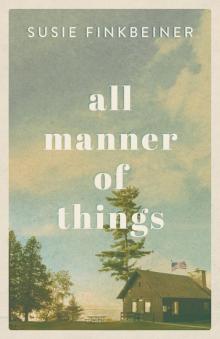 All Manner of Things
All Manner of Things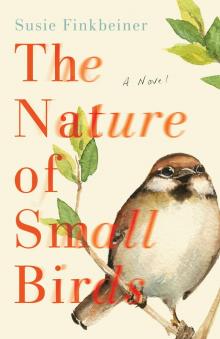 The Nature of Small Birds
The Nature of Small Birds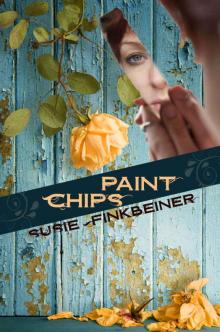 Paint Chips
Paint Chips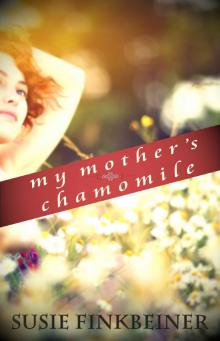 My Mother's Chamomile
My Mother's Chamomile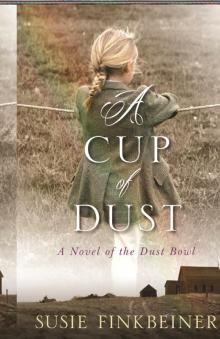 A Cup of Dust
A Cup of Dust